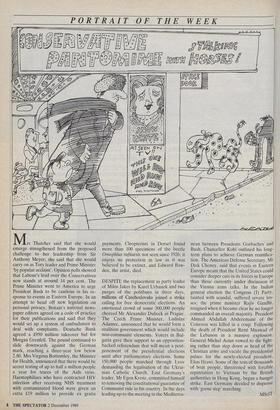PORTRAIT OF THE WEEK
Mrs Thatcher said that she would emerge strengthened from the proposed challenge to her leadership from Sir Anthony Meyer; she said that she would carry on as Tory leader and Prime Minister `by popular acclaim'. Opinion polls showed that Labour's lead over the Conservatives now stands at around 14 per cent. The Prime Minister went to America to urge President Bush to be cautious in his re- sponse to events in Eastern Europe. In an attempt to head off new legislation on personal privacy, Britain's national news- paper editors agreed on a code of practice for their publications and said that they would set up a system of ombudsmen to deal with complaints. Deutsche Bank agreed a £950 million takeover bid for Morgan Grenfell. The pound continued to slide downwards against the German mark, reaching a three-year low below 2.80. Mrs Virginia Bottomley, the Minister for Health, announced that there would be secret testing of up to half a million people a year for traces of the Aids virus. Haemophiliacs who have contracted HIV infection after receiving NHS treatment with contaminated blood were given an extra £19 million to provide ex gratia
payments. Cleopterists in Dorset found more than 100 specimens of the beetle Omophlus rufitarsis not seen since 1926; it enjoys no protection in law as it was believed to be extinct, and Edward Baw- den, the artist, died.
DESPITE the replacement as party leader of Milos Jakes by Karel Urbanek and two purges of the politburo in three days, millions of Czechoslovaks joined a strike calling for free democratic elections. An emotional crowd of some 300,000 people cheered Mr Alexander Dubcek in Prague. The Czech Prime Minister, Ladislav Adamec, announced that he would form a coalition government which would include non-communist elements. Voters in Bul- garia gave their support to an opposition- backed referendum that will mean a post- ponement of the presidential elections until after parliamentary elections. Some 150,000 people marched through Lvov demanding the legalisation of the Ukrai- nian Catholic Church. East Germany's leader, Mr Egon Krenz, committed himself to removing the constitutional guarantee of Communist rule in his country. In the days leading up to the meeting in the Mediterra-
nean between Presidents Gorbachev and Bush, Chancellor Kohl outlined his long- term plans to achieve German reunifica- tion. The American Defense Secretary, Mr Dick Cheney, said that events in Eastern Europe meant that the United States could consider deeper cuts in its forces in Europe than those currently under discussion at the Vienna arms talks. In the Indian general election the Congress (0 Party, tainted with scandal, suffered severe los- ses; the prime minister Rajiv Gandhi, resigned when it became clear he no longer commanded an overall majority. President Ahmed Abdallah Abderemane of the Comoros was killed in a coup. Following the death of President Rene Muawad of the Lebanon in a massive explosion, General Michel Aoun vowed to die fight- ing rather than step down as head of the Christian army and vacate the presidential palace for the newly-elected president, Elias Hrawi. Some of the tens of thousands of boat people, threatened with forcible repatriation to Vietnam by the British authorities in Hong Kong, began a hunger strike. East Germany decided to dispense with 'goose step' marching. MStJT










































































 Previous page
Previous page